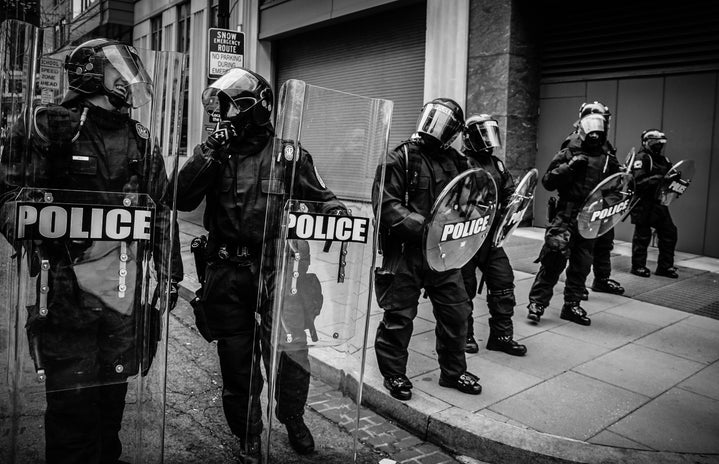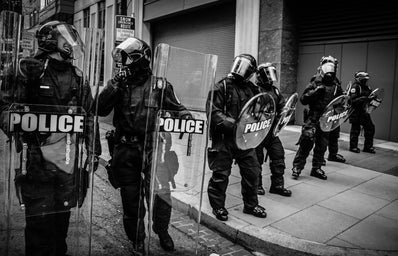There is a crisis of trust in policing, and the Met owe answers.
The devastating details of Sarah Everard’s murder in the wake of Wayne Couzens’ life sentencing has sent shock waves across the UK. Faith in the day to day safety of women and girls has been thrown into doubt with concern that those entrusted to protect them are part of the very institution that failed to protect Ms Everard, and the 79 other British women since then who have been killed in acts of violence.
At the forefront of its failings are claims that the Met is “institutionally corrupt” in its handling of violence against women and girls, shown by its systematic incompetence in vetting and safeguarding potentially dangerous officers. The Guardian has since reported that women have been killed by at least 15 serving or former police officers in the UK since 2009. Her murder therefore presents a watershed moment for what is being recognised as an epidemic of violence against women, one that until now, the UK police and other British institutions have continually failed to tackle.
Investigator Zoe Billingham, one of the top inspectors at Her Majesty’s Constabulary, has claimed that Couzens’ actions are a “betrayal for all officers, staff and PCSOs [which] we cannot write off as a one-off”. Billingham’s investigation into the abuse of position by police officers for sexual purposes, conducted last year, found that the Met Police lacked “sufficient resources” in their counter corruption units to recognise ill-behaviours, suspicious behaviours or instances where officers may be seeking “inappropriate relationships with victims”. Other failings extend to improper vetting processes, inadequate background checks and the fact that prior to 2019, officers could freely move between forces without investigation.
The most alarming aspect of Billingham’s report is her belief that “we have yet to see and we cannot say with certainty, that this will not happen again”. Such a judgement strongly suggests that the necessary procedures within the Met’s safeguarding system are not in place to protect women from future abuse by police officers. This is an appalling reality for an institution whose primary role is to protect the public and promote safety. While the police alone are not responsible for all violence against women and they cannot alone ‘solve’ the issue, as an organisation it is equipped with the unique powers and responsibilities that should ensure members of the public can rely on their services.
Some steps are being taken forward, as with how Metropolitan Police Commissioner, Dame Cressida Dick, has vowed to root out the “predatory” officers who plague the Met and will do so with an “external” adviser who will make recommendations over how to deal with “standards, corruption and sexual misconduct”. Though promising in some respects, this effort is not substantial for tackling what is a larger, much more entrenched issue that relates to systematic sexism within policing. The commissioner has also pledged an extra 650 new officers to patrol public areas in London where women are more vulnerable. Despite intentions to create a feeling of greater security, this solution will not solve the fact that girls and women feel fundamentally unsafe on British streets amidst recent events. Putting more officers on the post does nothing to prove to the British public, women especially, that they can once again place wholehearted faith in the police to protect them when this trust has been so immensely broken.
Recently retired from the Chair of the Metropolitan Black Police Association, Janet Hills spoke to BBC Radio 4 on Women’s Hour, with particular criticisms over the Met’s advice for women to “flag down a bus” when approached by a lone police officer. Insufficient, tone-deaf advice like this once again suggests the Met’s failure to fully comprehend the severity of the crisis and just how vulnerable women currently feel. The Commissioner talks of regaining the public’s trust, yet Hills points out that “people can throw around the word trust as if it is a tick-box exercise [but] that trust has to be earned and it has to be built, and we in policing have to do that work”. The only way for such trust to be gained, is a fundamental reassessment of how officers are vetted and approved and that is only possible through stringent and thorough background checks. These checks are also vital throughout an officer’s career, not just when they are brought into the force.
Hills’ experience as a black female officer also provides insight into how policing culture is not structured in a way that encourages female officers to speak up about matters of misconduct or misogyny. This culture of silence is dangerous for preventing potentially criminal occurrences within the police from being spotted, as with how Couzens remained in the police even after two reports of indecent exposure and his nickname ‘the rapist’. Change is only possible when the culture within the policing workforce begins to “understand what happens to people when they whistleblow and speak up about issues”. A sense of openness must be created so that officers know there will not be any ramifications for their career if they speak up. Furthermore, officers may not have to ‘speak up’ if zero-tolerance policies for derogatory language, ‘banter’ or behaviour were truly and properly enforced.
Violence against women is not a new phenomenon, it continues to be a systematic issue that the British police, government and judicial bodies have been, and are continually, failing to fight. Fortunately, recent discussions have created a platform whereby frustration can be voiced, stories can be told and solidarity can grow. The more openness we create around speaking out against misogyny and the less exploitation we tolerate within institutions such as the police, the safer our systems and the safer our streets will be.


